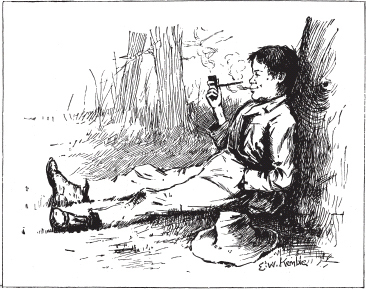

SOLID COMFORT
from Adventures of Huckleberry Finn (1885)
Cigars were Mark Twain’s lifelong companions. No other writer is more associated with the stogie, the cheroot, the seegar, the call-it-what-you-will. Twain once said that he came into this world asking for a light and that he expected to go out of it blowing smoke rings. Although not exactly the poster boy for the Surgeon General’s office, Twain passed his cigar, like a baton for an all-American relay team, to such later humorists as H.L. Mencken and Groucho Marx. It was a favorite prop for the wittily inclined, and we’re not just blowing smoke here. Twain probably never said, “To cease smoking is the easiest thing. I ought to know. I’ve done it a thousand times.” It’s another one of those quotes without verification or citation, but it undoubtedly sums up his attitude toward what his friend Rudyard Kipling called “the cheery light Of stumps burned to Friendship and Pleasure and Work and Fight.”
First . . . don’t smoke—that is, don’t smoke to excess. I am seventy-three and a half years old, and have been smoking for seventy-three of them. But I never smoke to excess—that is, I smoke in moderation, only one cigar at a time.
—“Advice to Girls” speech (1909)
Now whenever I buy a cigar that costs six cents I am suspicious of it. When it costs four and a quarter or five cents I smoke it with confidence.
—Autobiography
As an example to others, and not that I care for moderation myself, it has always been my rule never to smoke when asleep, and never refrain when awake. It is a good rule.
—1905 speech
As the darkness closed down and the stars came out and spangled the great mirror with jewels, we smoked meditatively in the solemn hush and forgot our troubles and our pains.
—Roughing It (1872)
When I was a youth I used to take all kinds of pledges, and do my best to keep them, but I never could, because I didn’t strike at the root of the habit—the desire; I generally broke down within the month. Once I tried limiting a habit. That worked tolerably well for a while. I pledged myself to smoke but one cigar a day. I kept the cigar waiting until bedtime, then I had a luxurious time with it. But desire persecuted me every day and all day long; so, within the week I found myself hunting for larger cigars than I had been used to smoke; then larger ones still, and still larger ones. Within the fortnight I was getting cigars made for me—on a yet larger pattern. They still grew and grew in size. Within the month my cigar had grown to such proportions that I could have used it as a crutch. It now seemed to me that a one-cigar limit was no real protection to a person, so I knocked my pledge on the head and resumed my liberty.
—Following the Equator (1897)
I have made it a rule never to smoke more than one cigar at a time. I have no other restrictions.
—1905 speech
I allow myself the fullest possible marvel of inspiration, consequently, I smoke fifteen cigars during my five hours’ working labor, and if my interest reaches the enthusiastic point, I smoke more. I smoke with all my might, and allow no intervals.
—1882 letter
Why, my boy, when they use to tell me I would shorten my life ten years by smoking they little knew the devotee they were wasting their puerile words upon—they little knew how trivial and valueless I would regard a decade that had no smoking in it!
—1870 letter
I smoke in bed until have to go to sleep; I wake up in the night, sometimes once, and I never waste any of these opportunities to smoke. The habit is so old and dear and precious to me that I would feel as you, sir, would feel if you should lose the only moral you’ve got. . . if you’ve got one; I am making no charges.
—1905 speech
I said to a friend, “I want to know if you can direct me to an honest tobacco merchant who will tell what is the worst cigar in the New York market . . . I want real tobacco. If you will do this and I find this man is as good as his word, I will guarantee him a regular market for a fair amount of his cigars.”
We found a tobacco dealer who would tell the truth . . . He produced what he called the very worst cigars he had in his shop. He let me experiment with one then and there. The test was satisfactory.
This was, after all, the real thing . . . I discovered that the “worst cigars,” so called, are the best for me, after all.
—Mark Twain’s Speeches (1910)
I will grant, here, that I have stopped smoking now and then, for a few months at a time, but it was not on principle, it was only to show off; it was to pulverize those critics who said I was a slave to my habits and couldn’t break my bonds.
—1905 speech
![]()